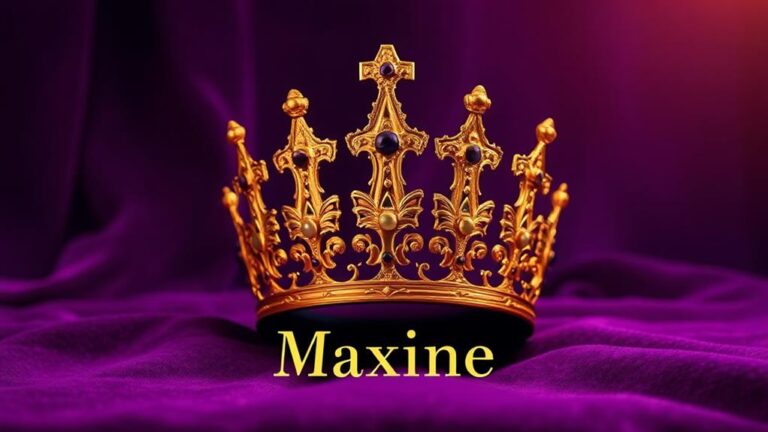Sybil Name Meaning in the Bible
The name Sybil, though not a direct biblical derivation, holds profound symbolic meaning influenced by the integration of sibyls into early Christian theology. Sibyls, female prophets of ancient Greece and Rome, were revered for their divine knowledge and prophetic wisdom. In Christian interpretation, they are seen as parallels to biblical prophets, symbolizing divine revelation, moral guidance, and spiritual connection. The name Sybil embodies strength, spiritual insight, and eternal legacy, reflecting a deep connection to biblical prophecies and spiritual themes. Exploring the historical and mythological context of the name Sybil reveals further insights into its enduring significance and spiritual power.
Key Takeaways
- Sybil’s biblical connection originates from the integration of sibyls into early Christian theology, aligning with prophetic traditions.
- Sibyls in the biblical context are seen as precursors to Christian prophets, emphasizing divine revelation and moral guidance.
- The name Sybil derives from Greek “Sibylla,” meaning prophetess, and is associated with prophetic wisdom and divine guidance.
- Biblical symbolism links Sybil to feminine spiritual power and the universal quest for divine revelation in human understanding.
- Christian interpretation of the name Sybil honors the prophetic tradition, connecting it to divine knowledge and spiritual insight.
Biblical Origins of Sybil

In Christian theology, the Sibyls were later associated with Old Covenant prophets, embodying a similar role of divine messengers. The Sibyls’ prophecies, as recorded in the Sibylline Oracles, often mirrored biblical motifs and ethical teachings, much like the themes of strength and courage found in names such as Madison.
For example, the Jewish Sibyl tradition emphasized monotheism, moral purity, and social justice, reflecting the ethical standards presented in biblical scriptures. The historical context of names highlights how names can encapsulate deeper meanings and connections to faith.
The Sibyls’ predictions also included apocalyptic visions and messianic themes, aligning with biblical eschatology. Therefore, while Sybil lacks direct biblical origins, its name encapsulates a broader tradition of divine inspiration and prophetic significance that intersects with biblical themes.
Meaning and Symbolism
The name Sybil originates from ancient Greek mythology, referring to female prophets known as sibyls who were believed to possess divine knowledge. In biblical contexts, the symbolic meaning of Sybil is associated with prophetic wisdom and reverence, mirroring the characteristics of Old Covenant prophets. This alignment with sacred prophecy imbues the name Sybil with a deep sense of religious significance and mystical authority.
Additionally, the name also resonates with themes of divine guidance and trust, emphasizing the importance of relying on spiritual insight and wisdom in one’s life.
Ancient Greek Origins
Greek mythology provides the foundation for the name Sybil, derived from the Greek term “Σίβυλλα” (Sibylla), meaning “prophetess” or “sibyl.” These sibyls were revered female prophets who practiced at sacred sites in the ancient world, believed to possess divine knowledge and the ability to interpret the gods’ will.
In Greek mythology, prophetic women known as sibyls were consulted for their wisdom and predictions of the future, playing a significant role in shaping the cultural and religious beliefs of ancient civilizations.
The sibyls were often associated with Apollo, the god of prophecy, and were thought to have been inspired by him. They were seen as intermediaries between the mortal world and the divine domain, providing essential advice and foretold events through their prophetic abilities.
The name Sybil hence carries a rich historical and mythological significance, symbolizing the power and wisdom embodied by these prophetic women. It is through this context that the name Sybil has been adopted and revered in various cultures, retaining its enduring appeal and profound meaning.
The reverence for sibyls in ancient Greece underlines the name’s enduring legacy and its association with prophetic wisdom.
Biblical Symbolic Meaning**
Christian tradition adopted and reinterpreted the concept of the sibyls, drawing parallels between these ancient prophetesses and figures from Christian revelation. In biblical interpretation, sibyls were seen as precursors to Christian prophets, their prophetic symbolism mirroring themes of divine revelation and moral guidance. This reevaluation allowed early Christians to connect their faith with pre-Christian sources of wisdom, recognizing a shared pursuit of truth and understanding.
The symbolism of names, such as Sybil, reflects the virtues of strength and hope, emphasizing the importance of spiritual connection and renewal in the quest for understanding and guidance, akin to the symbolism and spiritual significance of names.
The sibyls’ prophetic symbolism, particularly in their use of natural imagery and calamitous predictions, resonated with Christian apocalyptic themes. For example, the Jewish Sibyl’s oracles, as seen in the Sibylline Oracles, emphasized moral and religious considerations, echoing Israel’s prophetic tradition. This convergence of prophetic symbolism underscores the universal human quest for spiritual guidance and moral clarity.
Biblical interpretation of the sibyls highlights their role as carriers of divine messages, similar to biblical prophets. This reinterpretation not only validates the sibyls’ prophetic role but also underscores the transcendent nature of divine revelation, accessible across cultures and epochs. Through this lens, the name Sybil, derived from the Greek term for prophetess, carries a profound biblical symbolic meaning, encapsulating the quest for divine wisdom and human understanding.
Historical Context in Scripture

Although the name Sybil does not directly appear in the Bible, its historical context is rooted in the broader cultural and mythological landscape of the ancient world that influenced early Christian thought. The concept of the Sybils, female prophets divinely inspired by gods, originates from Greek and Roman mythology. These figures were believed to possess the ability to foretell the future, striking a chord with early Christian thinkers who saw parallels between the sibyls and the prophets of the Old Covenant.
This reflects a shared theme of spiritual inspiration that resonates throughout biblical narratives.
The significance of Sybil lies in its association with biblical prophecies, reflecting a confluence of pagan and Christian thought. Early Christians interpreted the sibyls as having divine inspiration, similar to the prophets in the Bible, thus integrating these figures into their theological framework.
This integration underscored the universal quest for divine revelation and the human need to understand and interpret divine messages. Therefore, while Sybil may not be a biblical name per se, its historical context speaks to the broader cultural currents that shaped early Christian theology and thought.
Greek Influence on the Name
The origins of the name Sybil are deeply intertwined with Greek mythology and its profound influence on later Christian thought. The term Sybil, derived from the Greek word *Σίβυλλα* (Sibylla), refers to a class of inspired virgins who were believed to reveal the decrees of the gods.
In Greek and Roman legend, these sibyls were female prophets practicing at various holy sites, providing oracles that were widely respected. The shift of these mythological figures into Christian culture is notable due to their association with divine knowledge and Old Covenant prophets.
The integration of Sybil into Christian nomenclature was facilitated by the belief that sibyls had foretold the coming of Jesus Christ. This connection allowed the name to be adopted into Christian countries during the Middle Ages, despite its pagan origins.
The name gained popularity in the 19th century, influenced by literary works such as Benjamin Disraeli’s novel *Sybil*. The Greek influence on the name Sybil highlights the complex interweaving of pagan and Christian traditions, reflecting a synthesis of religious and cultural practices over centuries. This synthesis demonstrates the dynamic nature of religious and cultural evolution.
The Sibyls in Ancient Mythology

The sibyls, ancient female prophets in Greek and Roman mythology, played divine prophetic roles, mediating between the mortal world and the domain of the gods. Their origins are deeply rooted in ancient Greek culture, where they were revered for their ability to foretell the future, often from sacred sites such as shrines and temples.
These prophetic figures, including the Erythraean and Cumaean Sibyls, were steeped in mythology, with their oracles being sought by kings and commoners alike, reflecting their significant influence in both religious and political spheres.
Ancient Greek Origins
- Greek Etymology: The word “Sibyl” is derived from Greek Σίβυλλα (Sibylla), meaning “prophetess” or “sibyl.”
- Biblical Connections: Although rooted in Greek mythology, the sibyls were later referenced in Christian theology due to their predictions of Christ’s coming, establishing a bridge between pagan and Christian beliefs.
- Historical Significance: The sibyls played a pivotal role in ancient cultures as advisors and seers, influencing decisions in various societies.
- Symbolic Meaning: The name Sybil symbolizes wisdom, intuition, and a connection to the divine.
- Cultural Impact: The figure of the sibyl has inspired numerous literary and artistic works, serving as a symbol of prophetic knowledge and divine insight.
This etymological and cultural background provides a deeper understanding of the name Sybil, reflecting its profound historical and symbolic significance.
Divine Prophetic Roles**
Ancient mythology is replete with figures of revered wisdom and foresight, among whom the sibyls stand out as emblematic figures of divine prophecy. In the Greek and Roman traditions, sibyls were seen as intermediaries between the mortal world and the divine, providing humans with prophetic inspiration and spiritual insight. These female prophets were believed to be influenced by the gods, particularly Apollo, who was considered the patron of prophecy and divine wisdom.
Their prophetic roles were multifaceted, encapsulating various spiritual practices and mystical experiences. Sibyls were known for their ability to interpret omens and visions, offering guidance and foretelling future events. This capacity for divine prophecy made them highly respected figures, often consulted by kings and leaders seeking insight into the future.
The sibyls’ divine prophetic roles underscore the enduring significance of spiritual and prophetic traditions in ancient cultures.
The name Sybil, derived from these figures, carries a profound cultural and historical significance, symbolizing the pursuit of spiritual insight and divine knowledge. This legacy continues to inspire, fostering a deep respect for the mystical and the prophetic.
Christian Interpretation and Use
Christian interpretation of the name Sybil draws heavily from the legacy of the sibyls in ancient Greek and Roman mythology, where these female prophets were revered for their divine knowledge and prophetic abilities. In Christian theology, the sibyls were celebrated as having foreseen the coming of Christ and the events of the New [COVENANT], aligning them with the prophets of the [ANCIENT WRITINGS]. This fusion of ancient prophetic tradition and Christian symbolism brought the name Sybil into common use in the Middle Ages.
Key aspects of the Christian interpretation of the name Sybil include:
- Association with Biblical Prophecy: The sibyls were seen as parallels to the prophets of the [ANCIENT WRITINGS], with their prophecies often interpreted in light of Christian scripture.
- Christian Symbolism: The sibyls were integrated into Christian iconography, symbolizing the divine revelation that transcended the boundaries of the ancient and Christian worlds.
- Feminine Spiritual Authority: Sybil represents a figure of feminine spiritual power, embodying a prophetic tradition that was both ancient and Christian.
- Historical Significance: The name Sybil was popularized by early Christian theologians who saw the sibyls as precursors to Christian prophecy.
- Cultural Legacy: The name Sybil has been used to honor the prophetic tradition, signaling a connection to divine knowledge and spiritual insight.
Biblical References and Parallels

The name Sybil, derived from ancient Greek mythology, finds echoes in biblical prophecy and symbolism through its historical association with the sibyls, female prophets who were believed to possess divine knowledge. These parallels are significant because they underscore the reverence with which the sibyls were viewed, much like the prophets of the Old Covenant.
In exploring biblical references and parallels, it becomes evident that the concept of prophecy plays a pivotal role in both Christian and Greek antiquity. The sibyls, like their biblical counterparts such as Deborah and the prophet Isaiah, were entrusted with the sacred duty of conveying divine messages to humanity. This historical significance reflects in the use of the name Sybil, which symbolizes not just prophetic insight but also spiritual enlightenment.
Ancient texts, including Christian interpretations of the sibyls, highlight the prophetic symbolism embodied by the name Sybil. It suggests a deep connection to biblical prophecies that emphasize the importance of spiritual guidance and divine revelation. Consequently, the name Sybil transcends its mythological roots to resonate with the profound spiritual themes found in biblical narratives.
Spiritual Significance and Legacy**
Deeply intertwined with the concept of prophecy, the name Sybil carries a profound spiritual significance that transcends its roots in Greek mythology. Sybil was a generic term for female prophets revered in ancient cultures for their divine knowledge. The name’s historical legacy is marked by its adoption in Christian theology, where the sibyls were celebrated as having foreseen the coming of Jesus Christ.
- Prophetic Origins: Derived from Greek Σίβυλλα (Sibylla), meaning “prophetess” or “sibyl.”
- Christian Incorporation: Adopted in Christian theology to honor the sibyls’ divine knowledge and prophecies.
- Historical Use: Popularized in the Middle Ages and revived in the 19th century, inspired by Benjamin Disraeli’s novel “Sybil” (1845).
- Eternal Legacy: Continues to be used today, symbolizing strength and spiritual insight.
- Cultural Impact: Featured in literature and media, such as “The Picture of Dorian Gray” and “Downton Abbey,” contributing to its enduring appeal.
Through centuries, the name Sybil has maintained its spiritual significance and historical legacy, becoming a beacon for those seeking strength and divine guidance. Its usage reflects a deep respect for prophecy and divine wisdom, inspiring generations with its profound and timeless meaning.
Frequently Asked Questions
Is Sybil a Commonly Used Name in Modern Christian Families?
Sybil remains a moderately popular name in Christian families, influenced by its historical connection to the sibyls, ancient oracles cited in Christian tradition. Modern variations include Sibylle, Sibilla, and Sybille, reflecting its enduring appeal.
Is Sybil Considered a Biblical Name Despite Its Greek Origins?
Amidst ancient echoes, Sybil’s Greek origins intertwine with Christian significance. Though not a direct biblical name, Sybil’s historical prophecy and mystique have influenced modern naming trends, embodying a free-spirited legacy that transcends cultural boundaries.
Can Sybil Be Used as a Nickname for Another Name?
Sybil as a Nickname: While traditionally a standalone given name, Sybil can serve as a nickname for longer variations like Sibilla, Sybille, or Sibylla. For sibling names, consider pairing Sybil with other vintage options like Edith or Astrid for a cohesive and classic naming strategy.
How Does the Perception of Sybil From “Downton Abbey” Influence the Name’s Popularity?
The perception of Sybil from “Downton Abbey” greatly influences the name’s popularity, as it reinforces cultural associations with elegance and sophistication. This has contributed to the name’s resurgence in popularity, aligning with current name trends that value vintage and aristocratic influences.
Does Sybil Have Any Contemporary Cultural or Pop Culture Significance Outside of Religious Contexts?
Can the quintessential figure of Sybil extend beyond ancient prophetic lore? Indeed, Sybil permeates contemporary culture through literature, psychology, and art, symbolizing wisdom, intuition, and creativity, as seen in the iconic psychological case, artistic explorations, and literary depictions.
Rare and Unique Biblical Names
- Selah Name Meaning in the Bible
- Sheena Name Meaning in the Bible
- Sybil Name Meaning in the Bible
- Maxine Name Meaning in the Bible
- Maria Name Meaning in the Bible
Conclusion:
Sybil’s name, rooted in Greek mythology and intertwined with Jewish and Christian traditions, embodies the sublime and mystical essence of prophecy and divine wisdom. Its historical journey from ancient predictions to modern naming conventions is a proof of the enduring power of spiritual symbols and their ability to transcend epochs. This name stands as a beacon, guiding those who bear it toward the domains of intuition, insight, and enlightenment.






